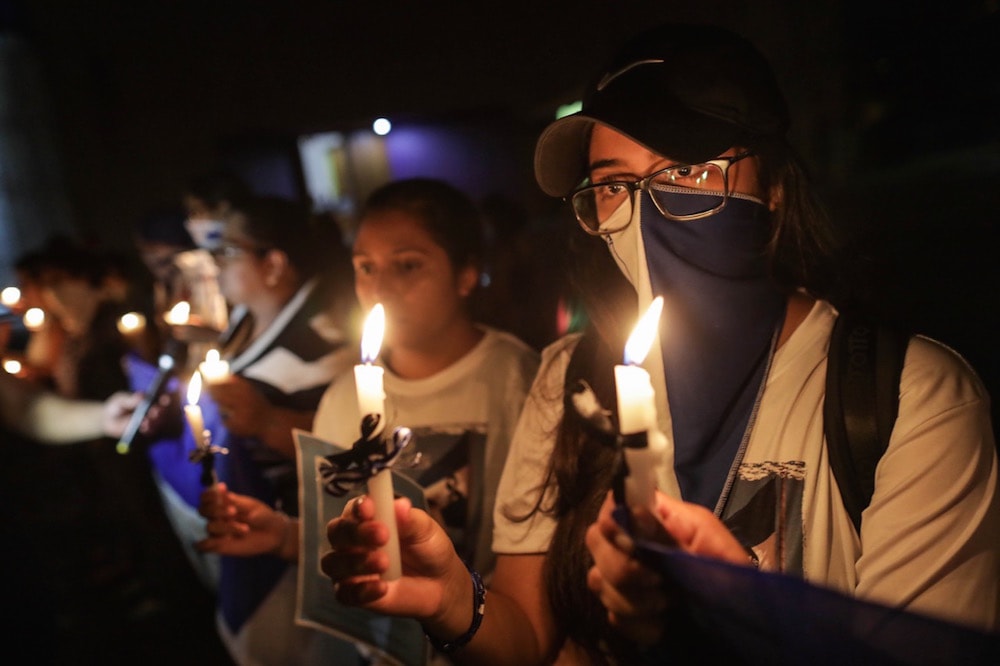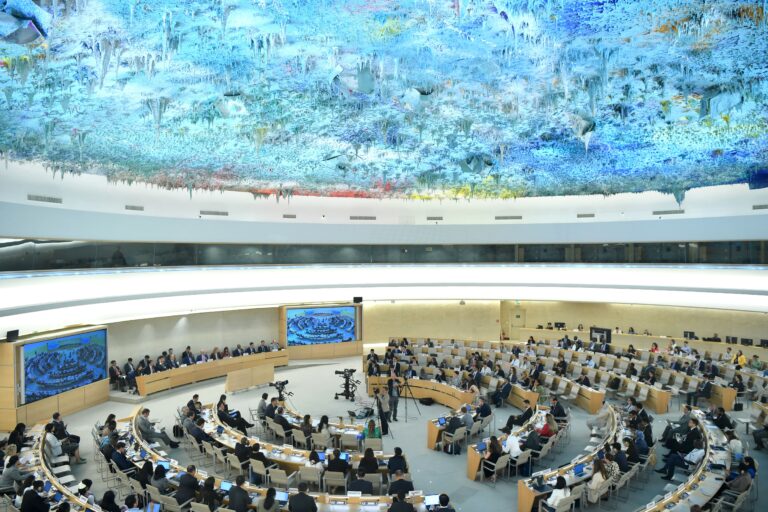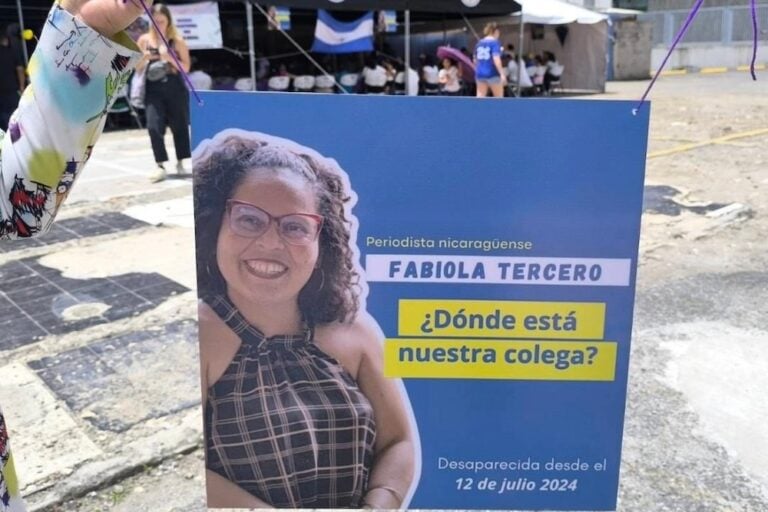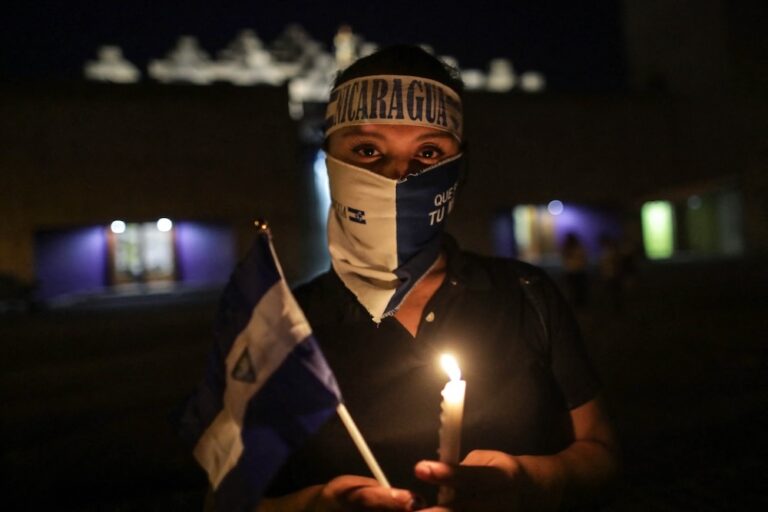After review by the UN Human Rights Council, journalists and civil society representatives shared with IFEX's Americas Regional Editor Paula Martins their struggle to present to the world the true state of freedom of expression and information in Nicaragua.
On 15 May, Nicaragua was assessed by peer states within the context of the Third Cycle of its Universal Periodic Review (UPR). This is a UN mechanism designed to review the human rights practices of member states every five years. During its review, the government, international organisations and civil society provide information on the situation of human rights on the ground. During an interactive dialogue in Geneva, UN member states ask questions about the information provided and may present recommendations to the reviewed country.
Given the importance of the UPR, a joint IFEX-ALC, AMARC-ALC and IAPA delegation travelled to Geneva in May. They met members of UN bodies, representatives of diplomatic missions and delegates from other civil society organisations. Their main message was clear – Nicaragua was experiencing a serious deterioration in freedom of expression and information.
Their key concerns were:
Attacks against journalists and a climate of impunity. Since April 2018, when protests erupted, there have been more than 250 cases of attacks or aggressive actions against media outlets, one journalist has been killed, and almost 60 others have fled the country.
Indirect censorship. There has been political control and undue interference in the work of the media.
Criminalisation of expression and assembly. More than 400 people have died and 2500 have been injured since the beginning of country-wide demonstrations in April 2018.
Most of these deaths were not investigated and remain unsolved. The press has been declared an enemy of the state, and journalists were accused of inciting hatred.
A peer review process
During the review session, 90 States provided statements. Many questions were asked. At the end, 259 recommendations were presented to Nicaragua. This was almost double the recommendations presented in the previous cycle, an illustration of the level of international apprehension with the Nicaragua crisis.
Nicaragua’s government replied with scepticism – 124 of those recommendations were rejected. Its position was that they distorted reality, or were unfounded.
This result did not surprise Guillermo Meldrano, one of the delegates that took part in the mission to Geneva. He coordinates the Violeta Barrios de Chamorro Foundation’s Periodismo con Enfoque de Derechos Humanos (Human Rights Focused Journalism) project. According to him, this is typical behaviour by the government in relation to human rights bodies.
Nicaragua does not participate, does not send representatives, does not present justifications. We have the impression they do not have the courage to face reality.
He adds that most recommendations were actually “very simple and could be easily accomplished by the state, if it had the political will to do it.
Patricia Orozco, a member of the Independent Journalists and Communicators of Nicaragua, says she was perplexed by the speech of the Nicaraguan diplomat responding to the UPR recommendations: “That country that he was describing is not Nicaragua. That is not the country in which we’re living.”
Both Meldrano and Orozco criticise the government’s “fallacy” in affirming there is free expression in Nicaragua. According to them, Ortega’s government has been trying to limit people’s access to information, so that “no one knows exactly what is going on in the country – they even went to the extreme of blocking access to the internet and to electricity to control information spread through social media,” affirms Meldrano.
The members of the delegation also disagree with Nicaragua’s allegations that a participatory process took place for the preparation of the country’s official report to the Human Rights Council. Nicaragua “doesn’t have a framework or rules to guide the preparation of this type of reports; there is no methodology; there is no consultation; there is no dialogue,” says Meldrano.
Orozco states that Nicaragua tries to sell to the world an unreal picture. “What the government says about freedom of expression in Nicaragua is a big lie.”
Wendy Quintero Chávez, journalist and vice-president of the AMARC-ALC women’s network, recalls her experience in Geneva: “It was profoundly moving – every time I recounted the stories, when I talked about the fears of the people, as a Nicaraguan, and as a journalist. Many of us are in exile today. […] Harassment and persecution continue in Nicaragua”.
This has been confirmed by international organisations such as the Inter-American Commission on Human Rights and its Freedom of Expression Rapporteur (RELE). In September 2018, RELE condemned the persistence of constant threats against the security of journalists, surveillance and political pressure against media outlets in Nicaragua. One year later, in September 2019, the CIDH follow-up mechanism on Nicaragua (MESENI) affirmed that “the context of systematic persecution and repression against independent media and journalists remains a reality in the country.”
A positive balance
Nicaraguans now know that these international entities exist, and that the state has to be accountable internationally.
Despite continuous challenges on the ground and the state’s denial of a human rights crisis in Nicaragua, activists and journalists consider the 2019 UPR process an important opportunity and a success story.
First, because it allowed mobilisation and mutual support amongst civil society organisations. Meldrano highlights the importance of this “strategic alliance” – it has increased participation of groups in the UPR process, with 29 alternative reports having submitted to the UN under this cycle. It was also the first time Nicaraguan groups intervened during the interactive dialogue in Geneva.
Quintero highlights that “it was very important to have a specific report on freedom of expression and assembly. These are rights that are intrinsic to our political constitution and that have been made completely vulnerable since April 2018”.
The UPR was an empowering tool for these groups, many of which have been working under distress and years of socio-political instability.
It was also a success because it allowed Nicaraguan media and civil society to expose their concerns internationally; as stressed by Orozco, “people abroad were offered an alternative view, and can now contrast the information provided by the government.” This, she concludes, will “make evident all their lies.”
“We managed to present evidence to several missions in Geneva about human rights violations by the government – violations that continue to take place, with the police as a main perpetrator.”
Meldrano agrees. “The final balance is positive.” He remembers that the UPR process was never covered so extensively before by the Nicaraguan media. “Nicaraguans now know that these international entities exist, and that the state has to be accountable internationally,” concludes Guillermo.
As Quintero describes it: “Our voices echoed”. She recalls that “many of the recommendations presented by states to Nicaragua were recommendations originally proposed by us”- recommendations that resonated with the diplomatic missions.
Nicaraguan civil society and journalists are taking back the narratives about democracy in Nicaragua and regaining agency in telling stories about human rights violations they face every day – making evident a continued state of emergency and exception.
This strengthened role is cause for celebration, but there is much work ahead. They ask for solidarity and support.
Alejandro Delgado, President of the IFEX-ALC Coordinating Committee, declares that the network – which brings together freedom of expression and press freedom defenders from 15 Latin American and Caribbean countries – “is convinced that the international community in general, and the members of the Inter-American human rights system in particular, should consider the UPR recommendations as their own and speak with a common voice, demanding Nicaragua’s authorities immediately accept and comply with the recommendations.”
Below are IFEX-ALC’s recommendations for addressing the deteriorating climate for freedom of expression in Nicaragua:
● Take immediate action to halt all acts of physical aggression, intimidation and threats originating from violent groups, para-police forces and paramilitary forces aligned with the government. Additionally, stop all government affiliates from using technical means to block access to media outlets or defaming, insulting or revealing the private information of independent journalists and opposition activists on social media networks.
● Carry out thorough investigations into all acts of violence against journalists and media outlets, including the assassination on 21 April 2018 of Ángel Eduardo Gahona, and apply the full force of the law to those responsible, in order to avoid a state of impunity that will encourage further violence.
● Immediately adopt the most appropriate measures to guarantee the physical and psychological safety of media professionals via the implementation of protection protocols.
● Respect and comply with the precautionary measures granted by the Inter-American Commission on Human Rights in favour of the victims, activists, journalists and their relatives who have been attacked and threatened.
● Ensure that the allocation of government advertising be subject to regulations that guarantee the application of fair, transparent and objective criteria.
● Fully guarantee the right to community-level media through access to adequate operating conditions and financing options from diverse sources.
● Refrain from criminalising demonstrations and those who participate in them. Guarantee protection for journalists covering demonstrations and ensure that security force responses are not repressive, but rather fulfil a role of safeguarding protestors.
● Work with national and international institutions to search for an appropriate and definitive framework that promotes respectful and tolerant dialogue and leads to a democratic solution to the serious and ongoing socio-political crisis in the country.



